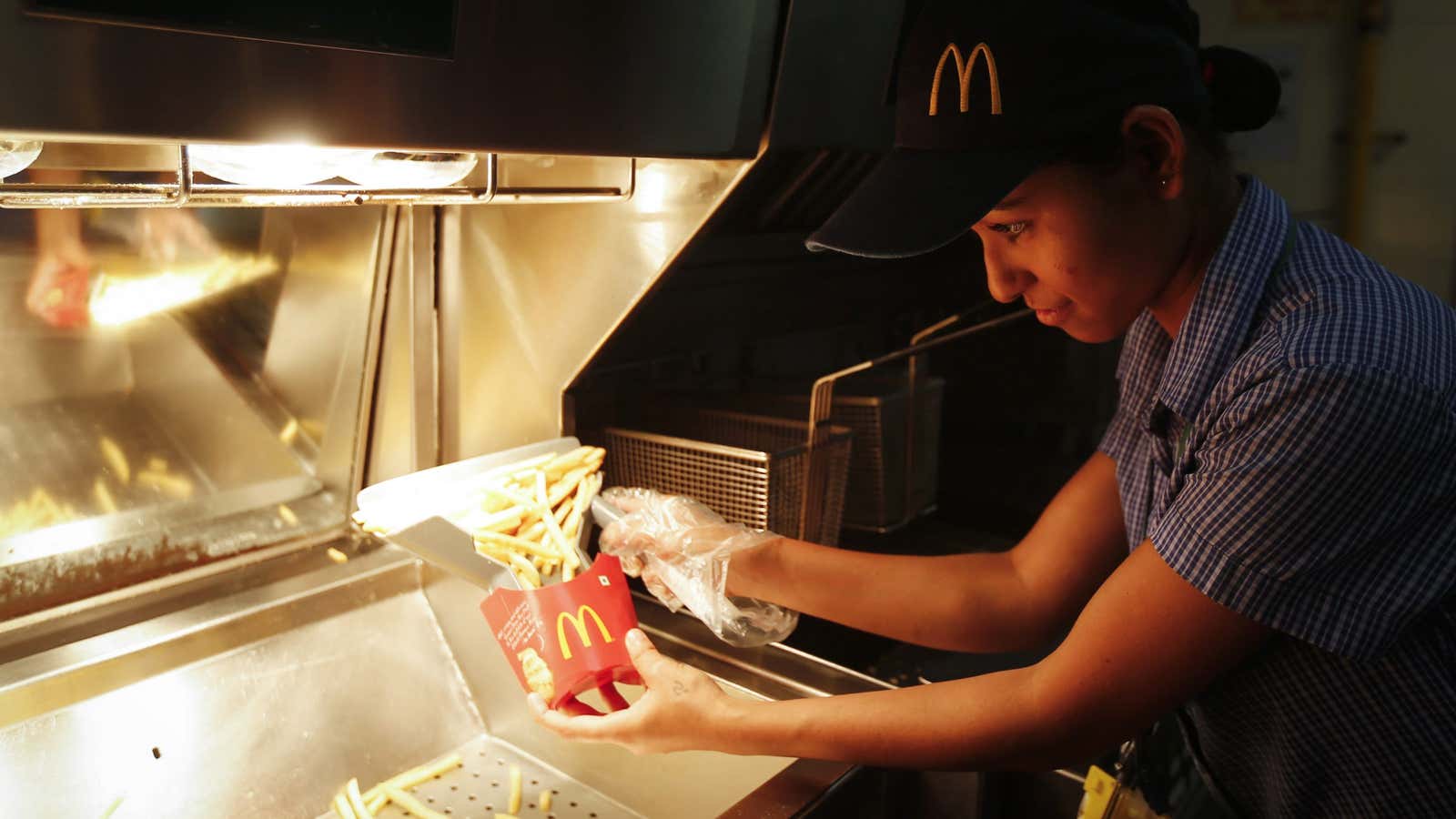McDonald’s Indian business has taken a year-end beating due to a power struggle with one of its local partners.
The American fast-food chain has shut 84 of its restaurants amid a legal battle with its joint venture partner, Connaught Plaza Restaurants (CPRL), which operates 169 outlets in north and east India. CPRL, on its part, has blamed a key supplier, Radhakrishna Foodland, for these closures. It alleged that the vendor has stopped providing supplies to its restaurants, citing low volumes and an uncertain future.
“Almost all the outlets in east India have been shut because of the move by (the) logistics partner. Others (in north India) are also under pressure due to a supply crunch,” Vikram Bakshi, CPRL’s managing director, told the Press Trust of India. Bakshi claims the vendor, “allegedly in collusion with McDonald’s Corporation and their wholly-owned subsidiary McDonald’s India Pvt Ltd…has decided to hold back stock paid for approximately Rs10 crore by us.”
Meanwhile, Radhakrishna Foodland has accused CPRL of non-payment of dues.
The shut-down comes after McDonald’s India (MIPL) issued a notice of termination of its franchise agreement to CPRL in August 2017, alleging that the latter had breached the terms of the partnership.
MIPL also announced that it would withdraw all branding rights—brand name, trademarks, designs, operational and marketing practice, and food recipes—from CPRL. McDonald’s then threatened closure if CPRL failed to respond suitably to the notice within 15 days. However, Bakshi has continued to operate the stores after contesting the termination notice at the National Company Law Tribunal.
Bakshi said that now the company is working towards finding alternate ways to resume business. “We will try and get them back in business over the next 7-10 days,” he told Quartz.
A McDonald’s spokesperson rubbished allegations of its collusion with CPRL’s vendors.
“This is between CPRL and their vendors, not MIPL. The allegation of us being involved in the decision comes from someone with whom we have had ongoing legal disputes. MIPL did not instruct any of CPRL’s vendors to stop delivery to CPRL. We were only informed of their decisions afterwards,” the company said in an e-mailed statement. However, MIPL said it did inform CPRL’s suppliers of its decision to terminate the franchise agreement.
Missing menu
Business has been difficult for Bakshi since the termination notice was issued.
Many vendors have stopped supplying ingredients and packaging material to CPRL. This has led to inconsistencies in the menu, with products such as its popular McFlurry and Soft Serve ice creams unavailable across some of its stores. Some outlets were even reportedly short on jalapenos, tomatoes, and milk supplies, the Wall Street Journal reported on Oct. 09.
At Connaught Place, the busy central business district of Delhi, three McDonald’s outlets have been turning away patrons. At one particular restaurant, a notice about the company’s falling out with its logistics partner was put up over a locked glass door was put up on Dec. 25. ”Due to the inability of our logistic partner & distribution centre to provide certain products to us, we are unable to serve your favourite McDonald’s food,” the notice says.
Meanwhile, industry observers felt that the dispute would have little impact on the brand’s consumer perception.
“Since the issue is one of control between the two partners and not a quality issue with the chain per say, things will go back to normal once it is resolved and restaurants open up,” said Gaurav Mayra, chairman, Franchise India.
McDonald’s in India
McDonald’s, which runs over 400 stores in India, arrived here in 1996.
The company operates through two partners: Bakshi’s CPRL and Westlife Development, led by Amit Jatia, which operates 260 restaurants in the south and west. For the financial year ending March 2017, Westlife Development posted a turnover of Rs930.8 crore, according to a listing on the stock exchange. Shares of Westlife Development dropped by 1.19% on Dec. 26 amid the news of closures in parts of northern and eastern India.
Since its arrival, McDonald’s has helped shape fast-food consumption in India. The American giant controls a 15.5% share of the market in the country, the second-highest after pizza chain Domino’s, according to 2016 data provided by Euromonitor.
In an abrupt public announcement in August 2013, McDonald’s ousted Bakshi as managing director of CPRL over alleged financial irregularities. It claimed that Bakshi’s other business interests were benefiting through his management of CPRL. Bakshi moved the Company Law Board (now the National Company Law Tribunal or NCLT) in September 2013, arguing that his removal was intended to buy him out at a lower valuation for McDonald’s to take full control of CPRL’s business.
McDonald’s is reportedly scouting for a new business partner to run stores in north and east India.
